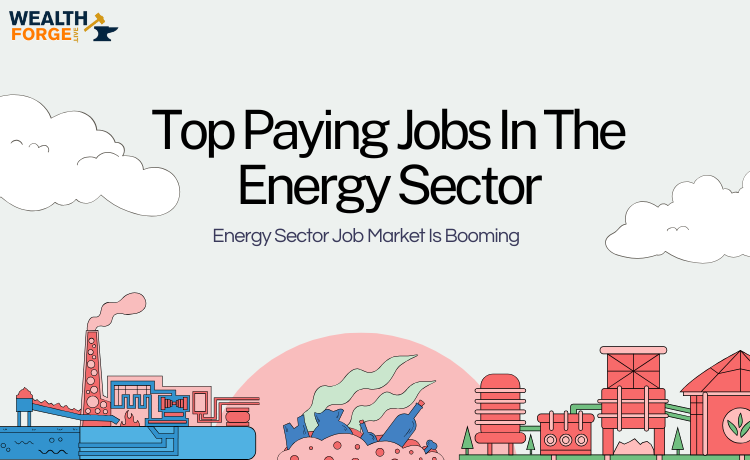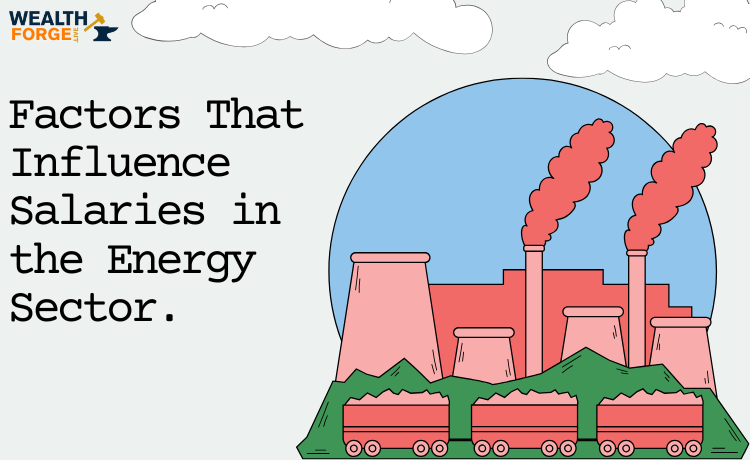Are you wondering where the energy industry’s next big paychecks are hiding?
Whether fresh out of college, planning a career switch, or already working your way up, the energy sector is buzzing with opportunity and high earning potential in 2025!
This isn’t just about oil rigs and power plants. Today’s energy market is a launchpad for tech-savvy innovators and leaders who want to drive progress while securing lucrative salaries.
This blog will explain which roles offer the best pay, what drives those salaries, the credentials you need, and actionable advice to help you shine in this dynamic field.
What we have cover!
- 1 The 2025 Energy Sector Job Market Is Booming
- 2 Factors That Influence Salaries in the Energy Sector
- 3 The Top 10 High-Paying Jobs in the Energy Sector (2025 Edition)
- 3.1 1. Petroleum Engineer
- 3.2 2. Renewable Energy Project Manager
- 3.3 3. Energy Trader
- 3.4 4. Nuclear Engineer
- 3.5 5. Wind Energy Engineer
- 3.6 6. Power Systems Engineer
- 3.7 7. Energy Data Scientist
- 3.8 8. Environmental Health and Safety (EHS) Manager
- 3.9 9. Geoscientist (Energy Sector)
- 3.10 10. Solar Energy Systems Designer
- 4 Your Roadmap: Education and Training for Top Energy Jobs
- 5 The Future of Energy Careers
- 6 Take Charge of Your Energy Career
The 2025 Energy Sector Job Market Is Booming

The energy sector in 2025 is more diverse than ever. Demand for skilled professionals is rising in traditional oil & gas, renewables, nuclear, and energy tech. From data scientists fueling AI-driven energy management to engineers designing next-gen solar grids, these opportunities promise excitement and impressive salaries!
Trends pointing to stronger job growth include:
- The push for clean and sustainable energy sources.
- Automation and digital transformation in processing and distribution.
- Regulatory and policy shifts are driving innovation and compliance.
According to the U.S. Bureau of Labor Statistics and authoritative industry sources like the International Energy Agency, energy jobs are projected to see steady (and in some fields, explosive) growth through 2025 and beyond. [Source](https://www.bls.gov/ooh/architecture-and-engineering/home.htm), [IEA Energy Employment](https://www.iea.org/topics/employment).
Factors That Influence Salaries in the Energy Sector

Why do some energy professionals make twice what others do? Several factors impact your earning potential, and understanding them gives you a competitive edge.
1. Experience Level
The more hands-on expertise you have, the higher your salary will rise. Senior roles, especially those with leadership or specialized technical skills, command top dollar.
2. Location
Energy hubs like Houston, Calgary, Dubai, and regions active in renewables (like California or Germany) offer the highest payouts due to demand, cost of living, and concentration of energy firms.
3. Industry Segment
Oil, gas, renewables, and nuclear each have their salary sweet spots. Jobs in new or high-demand technologies (think green hydrogen or grid analytics) often boast the highest salaries.
4. Education & Certification
A bachelor’s degree may be enough for some roles, but higher salaries often require advanced degrees, certifications, or safety credentials.
5. Company Size
Global giants (Shell, ExxonMobil, Siemens, NextEra) typically pay more than small local firms, but startups and disruptors might offer equity or rapid career growth.
The Top 10 High-Paying Jobs in the Energy Sector (2025 Edition)
Looking for the best bang for your degree (and buck)? Here are the standout roles ranked by their earning power and influence!
1. Petroleum Engineer
Average Salary: $140,000–$220,000
What They Do: Design and develop methods for extracting oil and gas from deposits below the earth’s surface.
Qualifications: Bachelor’s in Petroleum Engineering or related field. Advanced degrees boost potential.
2. Renewable Energy Project Manager
Average Salary: $120,000–$180,000
What They Do: Lead the development and rollout of large-scale solar, wind, and hydro projects.
Qualifications: Bachelor’s in Engineering, Environmental Science, or Management; MBAs are a plus.
3. Energy Trader
Average Salary: $130,000–$200,000+ (including bonuses)
What They Do: Buy and sell energy or energy futures on financial markets, balancing commodity risk.
Qualifications: Degrees in Finance, Economics, or Energy Management; certifications in trading are valuable.
4. Nuclear Engineer
Average Salary: $110,000–$165,000
What They Do: Research and design systems for nuclear power plants, focusing on safety and efficiency.
Qualifications: Bachelor’s or Master’s in Nuclear Engineering; licenses as required.
5. Wind Energy Engineer
Average Salary: $100,000–$150,000
What They Do: Plan and optimize wind farm operations, design turbines, and maximize efficiency.
Qualifications: Mechanical or Electrical Engineering degree; specialized training in wind tech.
6. Power Systems Engineer
Average Salary: $105,000–$155,000
What They Do: Design and maintain the electrical infrastructure for power generation and transmission.
Qualifications: Electrical Engineering degree; relevant certification (e.g., NERC, PE).
7. Energy Data Scientist
Average Salary: $120,000–$170,000
What They Do: Analyze vast datasets to improve efficiency and predict consumption, production, and grid management trends.
Qualifications: Advanced degrees in Data Science, Computer Science, or Engineering.
8. Environmental Health and Safety (EHS) Manager
Average Salary: $90,000–$140,000
What They Do: Ensure workplaces comply with environmental and safety regulations, minimising risks.
Qualifications: Bachelor’s in occupational safety, environmental science, or related field; certifications like CSP.
9. Geoscientist (Energy Sector)
Average Salary: $110,000–$180,000
What They Do: Analyze geological data to guide exploration for oil, gas, and renewables.
Qualifications: Advanced degree in Geology or Geophysics; field experience.
10. Solar Energy Systems Designer
Average Salary: $90,000–$135,000
What They Do: Create custom solar power solutions for commercial and residential clients.
Qualifications: Engineering degree, solar design certifications.
Pro Tip: Emerging fields like green hydrogen, battery storage, and grid management AI are already seeing above-average salaries for skilled professionals. Stay agile and keep an eye on industry trends!
Your Roadmap: Education and Training for Top Energy Jobs
Excited by the salary ranges above? Here’s how to qualify and compete for those roles:
Relevant Degrees
- Engineering (Petroleum, Mechanical, Electrical, Chemical, Civil)
- Environmental Science and Renewable Energy
- Data Science or Computer Science for digital/AI-focused roles
- Finance or Economics for trading and market analysis
Certifications
- Engineer-in-Training (EIT) / Professional Engineer (PE)
- Project Management Professional (PMP)
- Certified Energy Manager (CEM)
- OSHA Safety Certification
- LEED Accreditation (for green building and sustainability roles)
- Wind or Solar Certifications (NABCEP, GWO)
Training Programs
- On-the-job apprenticeships and internships
- Industry workshops, especially for emerging tech (AI, IoT, cybersecurity in energy)
- Online courses from top institutions (Coursera Energy Programs)
The Future of Energy Careers
Energy careers in 2025 are a springboard for stability, advancement, and innovation! Sustainability drives job creation, and digital transformation creates demand for new skills almost overnight.
- Green Energy is expected to account for 60% + of new jobs globally by 2030 (IEA).
- Digitalization means coders and data experts will continue to command premium salaries.
- Uniform regulations across the U.S., EU, and Asia will raise safety, environmental, and performance standards, increasing demand for certified professionals.
Here is complete path way on How to Navigate a Career Change and Become a Bartender Successfully
Quick FAQs
Q1. Are energy jobs recession-proof?
While some sectors fluctuate, energy (especially utility and renewables) is historically stable.
Q2. I don’t have an engineering degree. Can I still work in energy?
Absolutely! Roles in business analysis, project management, HR, and sales are vital and also pay well.
Q3. How do I stand out to top energy employers?
Gain hands-on experience (internships), develop technical/soft skills, and pursue relevant certifications.
Take Charge of Your Energy Career
There’s never been a more exciting time to work in energy! High-paying roles await those ready to upskill and adapt. Research, network with professionals, and invest in your education to unlock these top careers.
Want the inside scoop, salary updates, and real interviews with pros in the industry? Subscribe to our newsletter and check out leading industry job boards like Indeed Energy and Energy Jobline.
Get ready to power up your future—with passion, purpose, and a paycheck to match!

